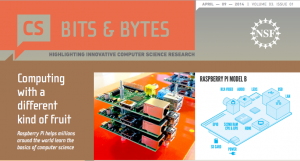 The following is a special contribution to this blog by Gera Jochum. Jochum is the Communications Specialist for the Computer & Information Science & Engineering (CISE) Directorate at the National Science Foundation (NSF).
The following is a special contribution to this blog by Gera Jochum. Jochum is the Communications Specialist for the Computer & Information Science & Engineering (CISE) Directorate at the National Science Foundation (NSF).
The National Science Foundation (NSF) released its first issue of the third volume of CS Bits & Bytes today. The issue focuses on the Raspberry Pi platform, which was created as a cheap, accessible and programmable computer that has been used around the world to demonstrate how computers work. The use of Raspberry Pi units to build a cluster called Meteor by Rick Wagner of the San Diego Supercomputing Center is featured. Wagner says,
The low cost of the Raspberry Pi means that each student can have dedicated access to his or her own small cluster for exploring. Meteor could then serve as a stage for students to present their work or test it on a larger scale.
CS Bits & Bytes is a biweekly newsletter developed to make computer science more accessible to educators and learners around the world. Each issue of CS Bits & Bytes highlights innovative computer science research, often at the intersection with other disciplines, and includes profiles of the individuals who do this exciting work, links for further exploration, and interactive activities. The newsletter is distributed to over 1200 subscribers from more than 17 countries. An archive of over 30 past issues can be found on the website for continued use.
Volume 3 incorporates feedback from teachers for a new look. The team would to love to hear feedback about the new look and especially how CS Bits & Bytes is used by its readers.









